English Words in Action, Group F
(a variety of English words which have developed through history and are currently used in our modern age)
Simply click on this banner (or the following link) and you will be on your way to stimulate your brain for greater word comprehension with quizzes based on some of the words in this unit.
2. Something that is a failure, a non-starter, a wash out: Despite the positive critical reviews, commercially the new play was a flop.
2. To move limply, or heavily; to swing and to move in a loose, awkward, or uncontrolled way: The curtains were flopping around in the breeze which was coming through the open windows.
3. To fail completely; to be completely unsuccessful: The play flopped, or bombed, and all of their attempts to set things right also flopped miserably.
2. The British use a different term for a very cheap place to stay: In London, Bert only had enough money to stay at a doss-house.
2. Wreckage that is found floating on water; such as, the ocean: There was flotsam washing up on shore after a shipwreck had taken place.
3. Vagrant or unemployed persons who are constantly moving from one place to another one without any financial funds: For many years, cities around the world have had flotsams who have been begging for money during the day and sleeping in the backstreets at night.

Go to this Word A Day Revisited Index
so you can see more of Mickey Bach's cartoons.
2. A strip or ruffle of cloth which is attached to a piece of clothing by one edge: Alisa's dress had so many flounces that she kept getting them caught on things.
Dena's gown had several flounces with tiers or rows of pink lace.
3. Etymology: this sense of flounce, referring to "a strip, a pleat" or "ruffle of fabric attached on one edge", did not appear in English until the 18th century; despite the fact that flounce came from the Middle English frouncen, "to curl" in the 14th century.Fred's wife flounced around the house in a huff, yanking doors open and slamming them shut as she stomped from room to room.
2. To go with sudden determination or to move with exaggerated motions: The main dancer flounced off the stage with the other dancers who were flouncing off behind her in perfect unison.3. Etymology: the information regarding "flounce" is mixed up and uncertain.
The verb's first recorded use in English took place in 1542, and some linguists say it is related to the Norwegian verb flunsa, "to hurry" or "to work briskly"; and Swedish flunsa, "to fall with a splash" or "to plunge".
Such relationships can not be verified because these flunsa verbs didn't appear in those languages until the 18th century, long after flounce was already used in English.
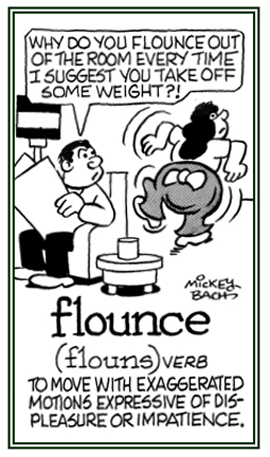
Go to this Word A Day Revisited Index
so you can see more of Mickey Bach's cartoons.
2. Something surprising or unexpected that happens by accident: By a total fluke, Trudy passed her statistics examination and got a better grade than she had expected.
3. Part of an anchor, barb on a harpoon or arrow; part of a whale's tail: The fluke of the beluga created a big splash when it dived below the surface of the sea.
4. A flatfish; especially, a flounder: The fishermen were delighted with their catch of flukes which always sold well at the fish market.
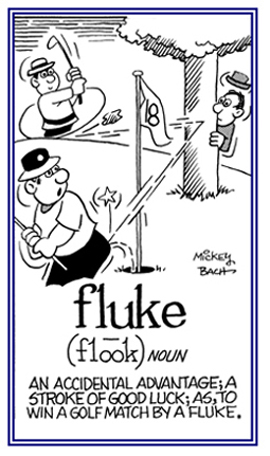
Go to this Word A Day Revisited Index
so you can see more of Mickey Bach's cartoons.
2. The minor weakness or deviation from what is regarded as normal in someone's character: Although Joan had her foibles, or shortcomings, her friends loved her for her generosity and positive attitudes.
One common foible that some people have is to remember only the pleasant things, or just the bad occurrences, that have taken place in their lives.
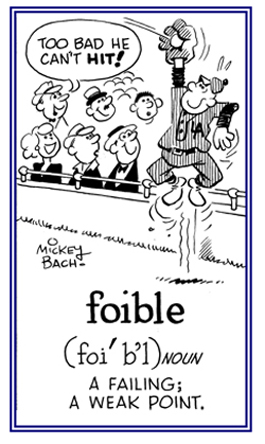
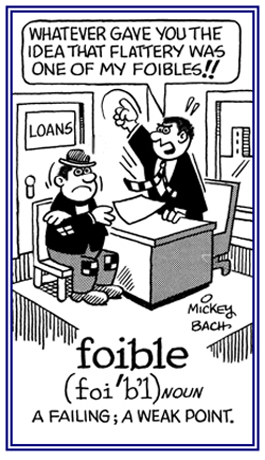
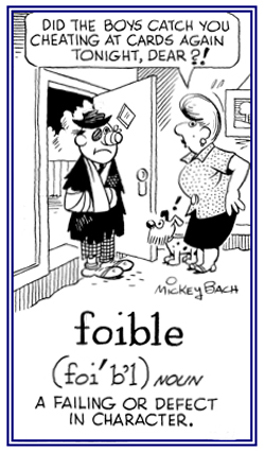
Go to this Word A Day Revisited Index
so you can see more of Mickey Bach's cartoons.
2. To keep something from happening or from being successful: Slipping and falling down the stairs is foiling Sally's dreams of becoming a dancer because she severely injured the joints in her knees.
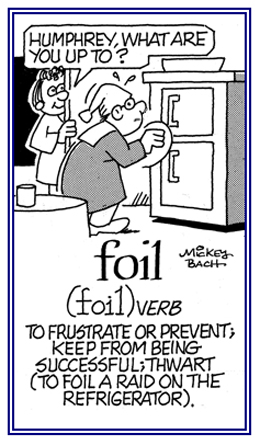
Go to this Word A Day Revisited Index
so you can see more of Mickey Bach's cartoons.
2. To force a person to accept something; especially, by deceit: A new tax increase was foisted on the citizens by the new administration of the government.
3. To pass off something as being genuine or worthwhile: The vendor on the street was foisting cheap watches to the tourists, which he said were made of gold and silver!
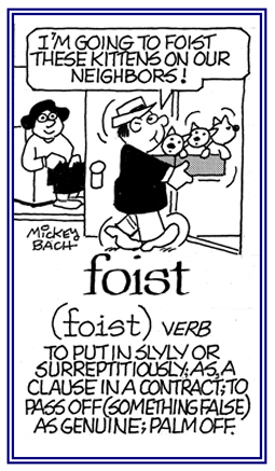
Go to this Word A Day Revisited Index
so you can see more of Mickey Bach's cartoons.
After the first sheep goes through the gate into the pen, the rest of them will follow.
Polly and Dina were sure that someone was following them last night as they were going to their car; so, they got in and drove away quickly before the person they thought was following them could get any closer.
2. To come after something in time or place or as part of a series: Manfred's auto accident was followed by a long period of recovery.After the severe storm ended, it was followed by a long period of rebuilding the damaged buildings and infrastructures of the community.
3. To happen after and as a result of something or to be true, or seem to be true, because of an action: From the evidence presented in the trial, it followed that the accused was guilty.4. To move forward on a road, a path, etc.: Tom said, "O.K. Jesse, follow that path and you will find the log cabin that you rented."
The road follows the river fairly closely.
5. To understand the sense or logic of something or someone: Sherry found it difficult to follow the logic of Alan's reasoning.2. Someone who does what another person, or other people say, should be done: Maribel had a tendency to be a follower and not a leader.
Ted and his family were very tired for a few days following their two-week trip to France last month.
Links to all of the groups of English words in action, Groups A to Z.
You may see the bibliographic list of sources of information for these words in action.


